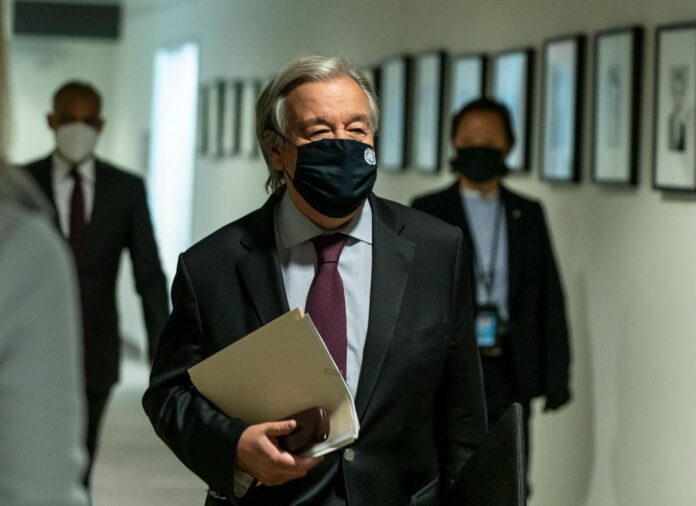| Translate This News In |
|---|
On Wednesday, Secretary-General Antonio Guterres warned that “vaccine nationalism” is moving “at full speed,” leaving poor people around the world watching coronavirus inoculation preparations in some rich countries and wondering if and when they will be vaccinated.
The Chief of the United Nations reiterated his call for the treatment of vaccines as a “global public good,” available to all, everywhere on the planet, particularly in Africa. And he appealed for $4.2 billion over the next two months for the COVAX programme of the World Health Organization, an ambitious project to buy and deliver coronavirus vaccines to the poorest people in the world.
Following a virtual UN meeting with the African Union, Guterres said at a news conference that COVAX funding is the only way to ensure the availability of vaccines in Africa and other developing areas.
WHO Chief Tedros Adhanom Ghebreyesus told a high-level UN General Assembly meeting on Covid-19 last week that to end the pandemic, “the light at the end of the tunnel is growing steadily brighter.” However, he added, vaccines “must be shared equally as global public goods, not as private goods that increase inequalities and become yet another reason why some people are left behind.”
Tedros said that without significant new funding, WHO’s cash-strapped ACT-Accelerator programme to quickly develop and fairly distribute vaccines, which includes the COVAX project, “is in danger of becoming no more than a noble gesture.” For 2021, COVAX would require an additional $23.9 billion, he said, stressing that the total $28 billion is less than half of 1% of the $11 trillion in stimulus packages announced so far by the Group of 20, the richest countries in the world.
The UK and Russia have already begun to vaccinate people against coronavirus. The Pfizer vaccine in the United States could receive a green light for emergency use in the coming days and the Moderna vaccine in the coming weeks. Canada announced Wednesday’s approval of the Pfizer vaccine,
Guterres said more than 2.2 million cases of coronavirus infections and over 53,000 deaths from Covid-19 have been reported by Africa’s 54 nations.
“There is real hope that vaccines will help to overcome the pandemic, in combination with other public health measures,” he said.
But to put an end to this, he added, vaccines must be available to all, and “the majority of African countries do not have sufficient funding to respond adequately to the crisis, partly because of the decline in demand and prices of their exports of commodities.”
John Nkengasong, director of the Africa Centers for Disease Control and Prevention, said in late November that coronavirus vaccinations on the continent may not start until next year’s second quarter. In the past, he told reporters, ‘I have seen how Africa is neglected when drugs are available.’
“It is true that we see vaccination nationalism moving at full speed,” the Chief of the United Nations said.
“We won’t be able to fight the pandemic if Africa isn’t properly supported,” he said. “There are several vaccines in the COVAX pipeline, and if the financing is guaranteed, it is perfectly possible to deliver them.”


















